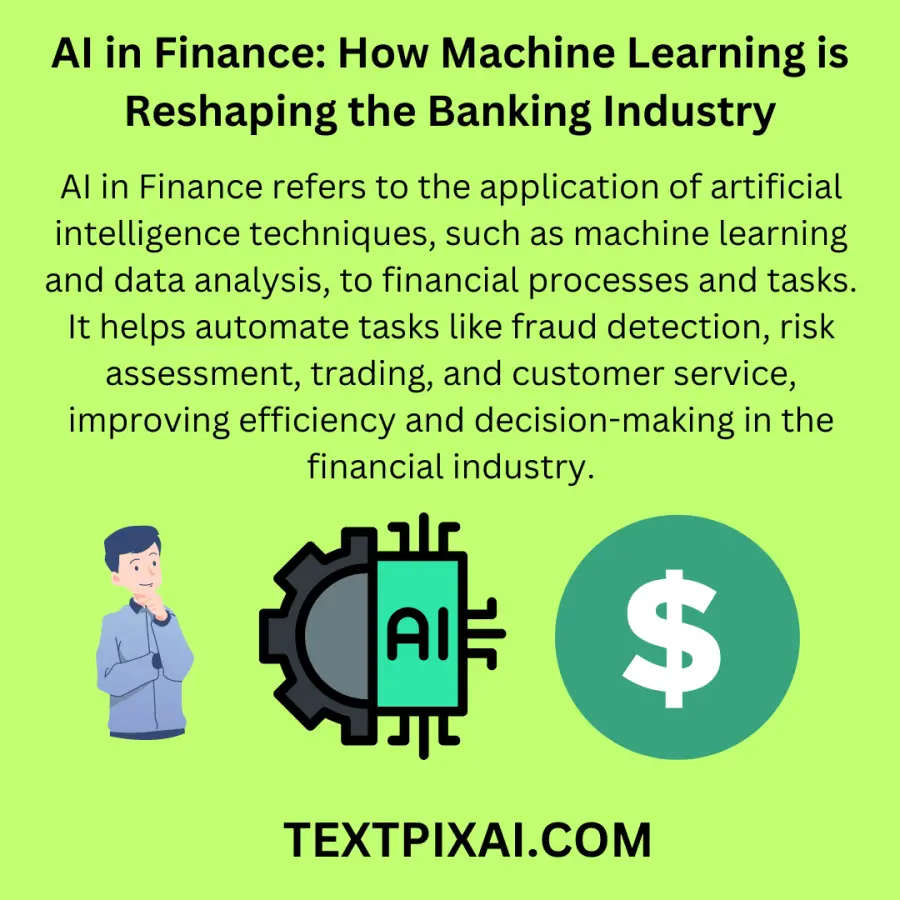AI in Finance: How Machine Learning is Reshaping the Banking Industry
What is Artificial Intelligence (AI) in Finance?
AI in finance uses smart computer systems to improve banking and financial services. These systems help with tasks like predicting market trends, detecting fraud and providing customer support.
Therefore, we can finally see that Artificial intelligence (AI) in finance refers to the application of advanced computational techniques to enhance financial operations and services. AI technologies, including machine learning (ML), data analytics, and natural language processing, are used to perform tasks that traditionally require human intelligence. We use these technologies to enable financial institutions to automate processes, improve decision-making, and offer personalized services.
In today's fast-paced world, the financial industry is continually evolving, and one of the most significant catalysts for this transformation is AI and Machine Learning (ML). AI has taken the financial sector by storm, changing the way banks operate, make decisions, and interact with their customers. For example, Commonwealth Bank of Australia was able to gather millions of data in a day by using AI. This initiative has helped the bank to accelerate the onboarding of new customers. The use of AI has also helped them to speed up the processing of invoices. Effective use of AI in our banks can improve Automatic matching of invoices, purchase orders, and receiving reports. A few other banks that use AI are Banca Mediolanum, Federal Bank Limited, NatWest Group and Valley Bank.
1. AI in Finance
The integration of AI in finance is a game-changer. It encompasses a wide range of technologies, including Machine Learning, Natural Language Processing (NLP), and Predictive Analytics, to name a few. These technologies enable banks and financial institutions to analyze large amounts of data swiftly and efficiently. It helps in making data-driven decisions that were previously impossible.
How AI is Used in Finance
The banking industry uses AI in various aspects to streamline operations, enhance customer experiences, and ensure regulatory compliance. Key applications include:
- Performance Measurement and Predictions: AI systems can analyze huge amounts of financial data to measure performance and make accurate predictions about market trends, investment opportunities and economic conditions.
- Real-time Calculations and Intelligent Data Retrieval: Financial institutions use AI for real-time data processing and retrieval, allowing for quick decision-making and efficient management of financial data.
- Customer Servicing: AI-driven chatbots and virtual assistants provide 24/7 customer support, answering queries, providing financial advice, and handling transactions.
- Risk and Fraud Management: Machine learning algorithms can detect anomalies and suspicious activities, which helps in mitigating risks and preventing fraud.
- Transparency and Compliance: AI helps ensure transparency by automating compliance processes, monitoring transactions, and generating regulatory reports.
- Automation of Operations: Routine tasks, such as document processing and data entry, are automated using AI, reducing human error and operational costs.
2. The Role of Machine Learning
Machine Learning (ML) plays a major role in AI's application in finance. ML algorithms can learn from historical data, identifying patterns and trends that humans might overlook. This capability is especially valuable when it comes to risk assessment and fraud detection.
What is Machine Learning (ML) in Finance?
Machine learning, a subset of AI, involves the development of algorithms that can learn from and make predictions based on data. In finance, ML is used for:
- Predictive Modeling: Creating models that predict future market trends, credit scores, and investment risks.
- Sentiment Analysis: Analyzing market sentiment from news articles, social media, and other sources to gauge public opinion and market movements.
- Anomaly Detection: Identifying unusual patterns in financial transactions that may indicate fraud or irregularities.
- Personalized Recommendations: Offering tailored financial products and services based on individual customer profiles and behavior.
3. Fraud Detection and Prevention
AI-powered systems can analyze transactions in real time by flagging any suspicious activities instantly. This proactive measure helps in safeguarding the bank's assets and ensures the security of customers' funds.
4. Customer Service and Chatbots
Currently, AI-driven chatbots are transforming customer service in the banking industry. These virtual assistants can handle routine queries, guide customers through processes, and provide 24/7 support which helps in improving overall customer satisfaction.
5. Personalized Financial Advice
Machine Learning algorithms can assess an individual's financial history and preferences to offer personalized investment advice and financial planning. This helps in empowering customers to make informed decisions.
You may also like to read:
AI Picture Trends: A Glimpse into the Future of Visual Content
6. Risk Assessment and Management
Many Banks now use AI to assess credit risks more accurately. ML models consider a broader range of factors, which reduce the chances of errors in credit decisions.
7. Algorithmic Trading
When we talk about Algorithmic Trading (AT), we refer to automated trading due to computer software that applies specific instructions to place a trade. Using AT, banks can accelerate profit generation far better than human traders. Hence, AI algorithms can analyze market trends and execute trades at speeds impossible for human traders. This leads to more efficient and profitable trading strategies.
8. Enhancing Credit Scoring
Credit scoring models are statistical tools that evaluate creditworthiness and determine the likelihood of default on credit obligations. Credit lenders and bureaus use this method to understand and evaluate the risk associated with their businesses. This model is used to assess the history of payment, utilization of credit, period of credit, accounts and even the enquiries associated with the credit. However, traditional credit scoring models have limitations. AI can incorporate alternative data sources, such as social media activity and utility bill payments, to provide a more comprehensive and fair assessment of creditworthiness.
9. Regulatory Compliance
AI helps banks stay compliant with complex and ever-changing regulations by automating compliance checks and ensuring adherence to standards.
10. Data Security and Privacy
The use of AI in finance also raises concerns about data security and privacy. Banks must invest in robust cybersecurity measures to protect sensitive customer information.
11. Future Trends in AI for Finance
The future of AI in finance holds exciting possibilities. These include the further development of quantum computing and the integration of blockchain technology to enhance security and transparency.
12. Challenges and Concerns
Even though AI offers immense benefits, it also has its own challenges. These challenges stood as a wall blocking AI from achieving 100% credibility. The challenges include algorithmic bias, ethical concerns, and the need for continuous training and updates.
13. The Human Element in Banking
Despite AI's capabilities, the human element remains crucial in the banking industry. This is because customers value human interactions for complex financial decisions and emotional support during financial crises.
14. Ethical Considerations
The ethical use of AI in finance is paramount. Financial institutions must ensure fairness, transparency, and accountability in AI-driven processes.
15. Applications: How AI Solves Real Challenges in Financial Services
AI addresses several challenges in the financial sector:
- Improving Accuracy and Efficiency: Automated systems reduce errors and increase the speed of financial operations, from trading to customer support.
- Enhancing Customer Engagement: AI-powered tools, such as personalized financial advice and targeted marketing, improve customer satisfaction and loyalty.
- Ensuring Availability and Speed: AI ensures that financial services are available around the clock, with instant responses and real-time processing.
- Driving Innovation: AI fosters innovation by enabling the development of new financial products, services, and business models.
- Enhancing Cybersecurity: AI helps protect financial institutions against cyber threats by detecting and responding to security breaches in real-time.
16. Benefits of AI in Finance
The integration of AI in finance offers numerous benefits, including:
- Automation: Streamlining repetitive tasks to save time and resources.
- Data Science and Analytics: Leveraging big data to derive actionable insights and make informed decisions.
- Generative AI: Creating new financial models, products, and solutions through innovative algorithms.
- Customer Engagement: Building stronger relationships with customers through personalized and efficient services.
- Breaking Down Data Silos: Enhancing data integration and accessibility across different departments and systems.








